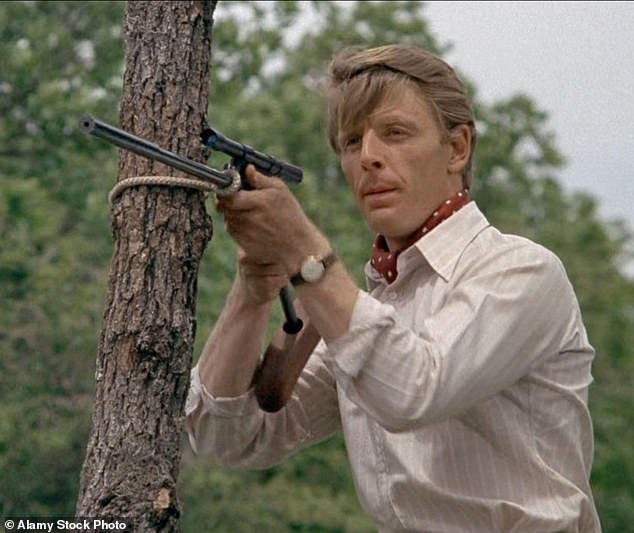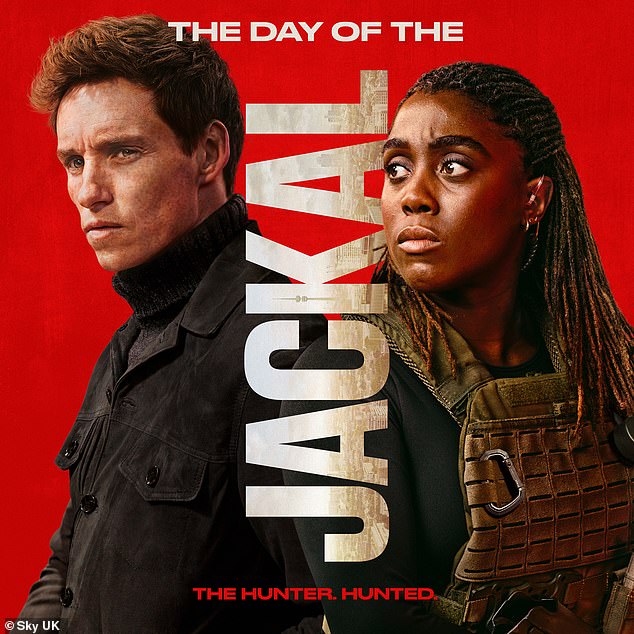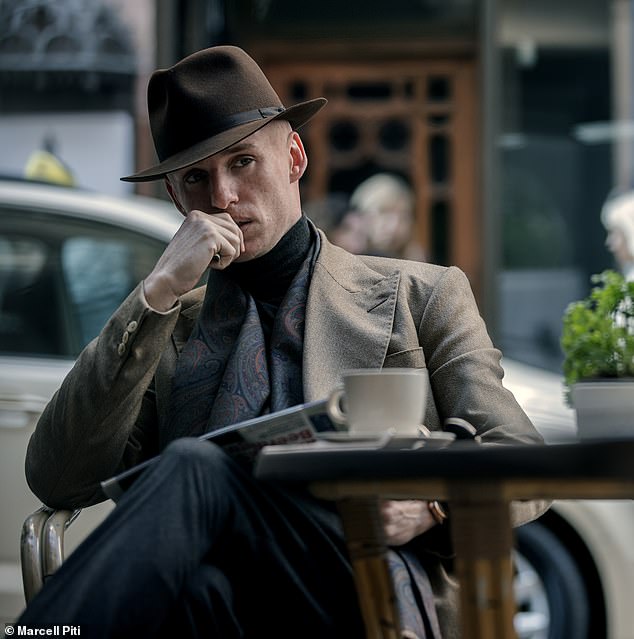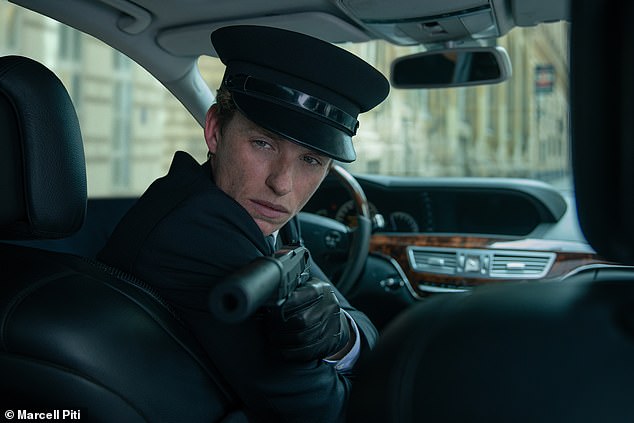Exactly 29 years ago today – November 4, 1995 – Israeli Prime Minister Yitzhak Rabin was assassinated by a far-right nationalist who was vehemently opposed to Rabin’s efforts to achieve peace with the Palestinians.
The killer, Yigal Amir, was reportedly carrying a Hebrew edition of The Day of the Jackal, Frederick Forsyth’s 1971 novel in which a professional hitman is hired to eliminate French President Charles de Gaulle.
There are many who feel that the Middle East would be a happier place now if the pragmatic Rabin had lived to pursue the peace process, but Forsyth’s book can hardly be blamed for giving Amir useful advice on how to carry out a seismic political assassination. .
After all, he shot Rabin twice at point-blank range. In the book, the assassin points his high-velocity rifle at de Gaulle from the window of a top-floor apartment. And there is another even more notable difference: the Jackal failed.
Eddie Redmayne as the Jackal in the new television version of Secrets of the Jackal Day

The 1973 film version starred Edward Fox as the killer.
However, the broad influence of Forsyth’s first novel has spread over the decades. Notorious Venezuelan terrorist Ilich Ramírez Sánchez was nicknamed ‘Carlos the Jackal’ after the book was seen in an apartment where he had hidden some weapons.
A heavily annotated copy was also found among Vladimir Arutyunian’s belongings after he attempted to kill US President George W. Bush in Tbilisi, Georgia, in 2005.
Additionally, modern writers such as Lee Child and Tom Clancy have credited The Day of the Jackal with transforming the thriller landscape forever. It was, Child says, “a groundbreaking Year Zero thriller.” It marked a radical change in the way things were done by people like Alistair MacLean and Hammond Innes, whose arguments boiled down, as Child said, to: “Will the bomb explode or will it be defused?”
Instead, Forsyth’s book and the unforgettable 1973 film version starring Edward Fox managed to generate biting tension even though everyone knew the assassination attempt would end in failure.
De Gaulle died not on Liberation Day 1963 under the crosshairs of an assassin’s rifle, but from an aneurysm seven years later, at age 79, while watching television. There were barely seven months left until the publication of The Day of the Jackal.
Instead of a traditional “will he, won’t he” narrative, the book delved into what Child describes as the “minutia” of preparation, drawing on Forsyth’s meticulous research.
And its success, according to Child, was a “millstone” on the shoulders of other authors. ‘We all had to perform at the same level. “There was a tendency throughout thriller writing to focus on the details.”
The Day of the Jackal is now getting a very 21st century makeover, in a ten-part TV drama starting this week. It stars Eddie Redmayne as the hitman, whose target is a tech mogul supposedly based on Elon Musk.
Redmayne has small boots to fill. Edward Fox was chosen, in part, because he was decidedly thin. Roger Moore, Michael Caine, Robert Redford and Jack Nicholson were rejected by director Fred Zinnemann.

Jackal Day launches Thursday on Sky Atlantic and NOW

The series stars Eddie Redmayne as the hitman, whose target is a technology mogul supposedly based on Elon Musk.
He wanted someone “lithe and lean,” and if Hollywood had never heard of him, even better. Zinnemann, who had directed big stars like Gary Cooper in High Noon and Frank Sinatra in From Here To Eternity, instead preferred a little-known actor who could, like any effective killer, “disappear into the crowd.”
He had liked Fox’s performance as the cuckolded Viscount Trimingham in the 1971 film The Go-Between. Then, much to the displeasure of the film’s financiers, Fox got the job. It catapulted him to stardom. The Day of the Jackal grossed millions at the box office.
Forsyth, however, got none of them. He had rejected an offer for the film rights of £17,500 plus a share of the profits, opting instead for a flat payment of £20,000.
However, money and recognition changed his life. When he sat down to write the novel he initially called The Jackal (adding ‘The Day of’ so no one would confuse it with a nature book), he was broke.
Then, in his early 30s, Forsyth had been an RAF pilot and then a foreign correspondent. But the BBC sacked him and Whitehall “defamed” him for, as he saw it, telling too many truths about the Biafran war in West Africa.
In the early 1970s he was homeless and moneyless, so on January 2, in the kitchen of a friend’s apartment, he sat down at his trusty portable typewriter, destroyed by a bullet during the war, to write a novel. .
He was inspired by his time at the Reuters news agency in Paris, where he covered numerous attempts on de Gaulle’s life (including one that involved the explosion of vases) by the OAS, right-wing paramilitaries opposed to Algerian independence.
He thought the OAS was too full of informants to carry out such a murder. Furthermore, the French counterintelligence services were the best in the world. But what if the terrorists brought in a highly qualified outsider?

Early reports of the series are mixed. Some say it’s brilliant, others say it’s boring.
Forsyth later described his decision to write a novel as “lunatic.” In addition to readers knowing how the plot would end, he was breaking more rules by creating an unnamed antihero and then placing him at the center of a fictional chase starring real politicians and police officers.
He considered Eagle, Lion, Wolf and Bear as code names for his main character, before settling on Jackal, explaining: “He’s elusive. He comes at night. He kills and disappears at dawn.
He completed the manuscript in just 35 days, but was rejected by publisher after publisher until Hutchinson gave him a £500 advance and a three-book contract. The Day Of The Jackal came out in June 1971, followed by The Odessa File and The Dogs Of War. They all became big bestsellers.
As for that exhaustive investigation, even the Public Records Office took notice. The Jackal creates a false identity by finding the grave of a child who would be around the same age if he had lived and then obtains his birth certificate and passport.
Forsyth knew that the KGB used this method, but when the film was released in 1973, he himself warned that it could be copied. Regulations became stricter, but it is still known in official circles as the “Jackal Day scam.”
Forsyth was not directly involved in the making of the film, but, once filming began in Paris, he was invited to meet Fox. Zinnemann kept his leading man in check, but Forsyth lured him out of his hotel one night, promising to introduce him to a real life hitman.
This was Armand, a Corsican mercenary whom Forsyth had met in Africa. They had a low-key dinner at a bistro, until the local prostitutes somehow discovered that a “movie star” was present and came in droves, making lewd suggestions that Fox didn’t understand.
Forty years later, at his home in the Chilterns, Forsyth told the story to lunch guests, who included Fox and his wife Joanna David. He told Fox that he had never translated what Parisian prostitutes told him. “No, you never did,” said Fox. ‘What was it?’
“They were offering you gifts, whatever you wanted, with the house,” Forsyth responded.
Then, when he was already 70, Fox reflected for a moment and then said wryly, ‘I guess there’s no point in going back?’
The new drama will take us all back, those of us who devoured the book and loved the movie. The first reports are contradictory. Some say the series is brilliant, others say it’s boring. Either way, it’s hard to imagine that 35 days on a battle-damaged typewriter could have been better spent.
- Jackal Day launches Thursday on Sky Atlantic and NOW

